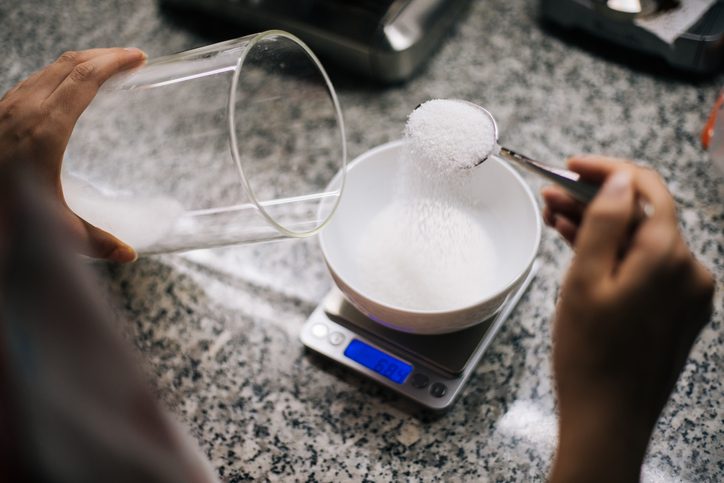Being the subject of constant demonization, sugar remains essential on a daily basis for various reasons. So, is it so bad for your health? Is it possible to consume it at any time of the day and in excessive quantities? Elements of answer in this article!
–
Sugar: definition and considerations
Sugar as it is commonly referred to is part of the organic class of carbohydrates. And although its usefulness is roughly the same, regardless of the form (the body transforms the carbohydrates ingested in the form of glucose), the latter constitute two categories: “Simple carbohydrates” and the “Complex carbohydrates”.
The first (where we store among others the glucose, fructose, sucrose) are characterized by a sweet taste and are often used in industrial products (although they are found in their natural state). They are composed of one or two molecules (we speak of monosaccharides and of disaccharides) and can quickly be mobilized by the organization.
The second, like starch, are of a different structure, require more time for the body to be digested. These are long chains of molecules that differ from simple sugars. Les polysaccharides I know find in bread, potatoes, cereals or tubers (peas, lentils, buckwheat…).
Note that some of these sugars, in particular lactose in dairy products and fructose in fruits, are naturally present in some foods. It is therefore not uncommon to observe, on the label of a product without added sugars, a high sugar content, since the latter naturally contain it.
The sugar to avoid is that which is added to everyday foods such as yogurts, cream desserts and other cakes. Sucrose, the one commonly called “white sugar”, comes from sugar cane or beets and crystallizes all the worries that we have around sugar.
So the equation is simple: it’s best not to overdo the added sugars in processed foods.
When quantity makes poison

Like many foods (and other small pleasures in life), it is not their consumption that is the problem, but the excesses. Indeed, sugar and more generally carbohydrates are essential for optimal functioning of the body, both physically and cognitively. But be careful not to exceed the recommendations!
Indeed, the WHO (World Health Organization) recommends not to exceed the 25g of sugars added per day, not counting those present in fruit and milk. This number can be revised upwards (it was 50 grams a few years ago) depending on various variables such as sex, height, weight and physical activity. And the least we can say is that this threshold of 25g can be reached very quickly.
For example, 25 grams of (added) sugars represent:
- Less than a can de soda de 33 cl;
- 4 to 5 squares sugar ;
- A chocolate bar ;
- A glass of juice of fruits ;
- Two fruit yogurts.
–
However, in France, the amount of sugar ingested reaches the 100 grams per day and per person! It is, in this regard, the quantity suggested by theConsidered (National Agency for Food, Environmental and Occupational Health Safety) which recommends not to exceed one hundred grams of sugars per day, excluding dairy products.
Evoked in this way, this figure gives the impression that we have sufficient room for maneuver, but this is without counting on the other foods that we consume during the day which, for the most part, also contain a certain amount of sugar!
It is therefore necessary to ensure its sugars intake and to favor foods that contain less (without making life impossible). No need to recall the consequences of overconsumption of sugar: obesity, diabetes, hypertension, cardiovascular illnesses, cancer development…

–
–
The consumption of sugar is therefore not prohibited but to be monitored. Thus, if you prefer sugar in your coffee, or an ice cream at the end of lunch, your body will not hold you particularly against you, and in certain specific cases, it is even the opposite!
Sugar, the fuel of choice for our body

We are used to hearing that the human body is a formidable machine, and for good reason: it is able to metabolize glucose and produce energy from other macronutrients that are proteins and lipids (fats). This process of gluconéogenèse (also called “Gluconeogenesis”) helps keep blood sugar (level of glucose in the blood) at a constant level.
However, nothing can meet certain needs as well as the carbohydrates and sugar that can be found here and there! Among other things, it is essential:
- For provide energy to the body and the brain;
- At energy storage, in the form of glycogen (a large molecule acting as a “reserve”, itself made up of a large quantity of glucose, the “sugar” that can be mobilized by the body);
- To the protein synthesis ;
- To the good operation of a very large number of cells.
Sugar consumption: what compromises?
The need for sugar increases as soon as you engage in physical activity. If all sports are not equal in terms of energy expenditure, all mobilize your reserves. It is therefore advisable to consume it before, but also after, at a time when your body calls for it, to quickly replenish your glycogen stock and recover from an intense effort.
It is therefore interesting to consume them at “strategic” moments like these, but not only. For example, you can take:
- Wakeafter several hours of sleep during which your body was in a fasting state;
- As a deadline approaches where your body will be strained (it can be a physical effort but also intellectual);
- With other foods, so that they are digested less quickly.
–
You can also sweeten your tea, coffee and even your plain yogurt with other foods like honey (rich in antioxidants and a source of potassium but also to be consumed in moderation) or stevia, which has a high sweetening power and remains an interesting alternative, provided you choose the right one in the store.
You will understand, everything is a question of balance!


